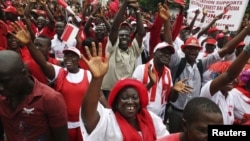The vice president for peace programs at the U.S.-based Carter Center, John Stremlau, said former Zambian President Rupiah Banda will lead the organization’s poll observer mission to monitor Sierra Leone’s November 17 general election.
“I welcome this opportunity to lead the Carter Center’s election observation mission, and it is my hope that these elections are credible, peaceful, and reflect the will of the Sierra Leonean people,” Banda said.
Stremlau said the former Zambian leader is scheduled to arrive in Sierra Leone the first week of November to monitor the poll.
Stremlau said the Carter Center has deployed eight long-term observers monitoring political activities in the West African country in the run-up to the election.
“They are getting settled in now around the country and, as of the middle of November, we will have a larger team of about 40 short-term observers who would be through the election period,” said Stremlau.
Stremlau said the election observers will witness the activities of the election administration, campaigning, and voter education, ahead of the vote.
Sierra Leone’s National Electoral Commission officially invited the Carter Center poll team to monitor the vote. Stremlau said his team will meet with officials of the electoral body to discuss preparations.
“They have enthusiastically welcomed the Carter Center to send its group of impartial observers that would probably come from some 15 or 20 countries, including mostly from African countries, to be deployed,” said Stremlau.
“We would meet with them and understand their concerns and evaluate their preparations for the election because one of the important elements of final reports that we render is whether or not the voters were adequately registered, whether they had the kind of support services going in,” he added.
Some Sierra Leoneans say international observers often visit only urban areas, but not the rural areas, where they said voter irregularities often occur.
Stremlau said their concerns are justified, but adds that the Carter Center’s poll observer mission monitors elections in accordance with the Declaration of Principles for International Election Observation and Code of Conduct backed by the United Nations and 40 election observation groups in 2005.
“One of the important criteria is you have national coverage. You have to be determined to [make the] effort to be widely dispersed in ways that make a credible balance between urban and rural areas,” said Stremlau.
“The concern that we should have is that all voters, no matter where they are elected, have a fair shot of having their voice properly registered and recorded. We are very confident that we have developed that capacity.”
Stremlau also said his poll team will assess the electoral process based on Sierra Leone’s national legal framework and its obligations for democratic elections contained in regional and international agreements.
“I welcome this opportunity to lead the Carter Center’s election observation mission, and it is my hope that these elections are credible, peaceful, and reflect the will of the Sierra Leonean people,” Banda said.
Stremlau said the former Zambian leader is scheduled to arrive in Sierra Leone the first week of November to monitor the poll.
Stremlau said the Carter Center has deployed eight long-term observers monitoring political activities in the West African country in the run-up to the election.
“They are getting settled in now around the country and, as of the middle of November, we will have a larger team of about 40 short-term observers who would be through the election period,” said Stremlau.
Stremlau said the election observers will witness the activities of the election administration, campaigning, and voter education, ahead of the vote.
Sierra Leone’s National Electoral Commission officially invited the Carter Center poll team to monitor the vote. Stremlau said his team will meet with officials of the electoral body to discuss preparations.
“They have enthusiastically welcomed the Carter Center to send its group of impartial observers that would probably come from some 15 or 20 countries, including mostly from African countries, to be deployed,” said Stremlau.
“We would meet with them and understand their concerns and evaluate their preparations for the election because one of the important elements of final reports that we render is whether or not the voters were adequately registered, whether they had the kind of support services going in,” he added.
Some Sierra Leoneans say international observers often visit only urban areas, but not the rural areas, where they said voter irregularities often occur.
Stremlau said their concerns are justified, but adds that the Carter Center’s poll observer mission monitors elections in accordance with the Declaration of Principles for International Election Observation and Code of Conduct backed by the United Nations and 40 election observation groups in 2005.
“One of the important criteria is you have national coverage. You have to be determined to [make the] effort to be widely dispersed in ways that make a credible balance between urban and rural areas,” said Stremlau.
“The concern that we should have is that all voters, no matter where they are elected, have a fair shot of having their voice properly registered and recorded. We are very confident that we have developed that capacity.”
Stremlau also said his poll team will assess the electoral process based on Sierra Leone’s national legal framework and its obligations for democratic elections contained in regional and international agreements.





